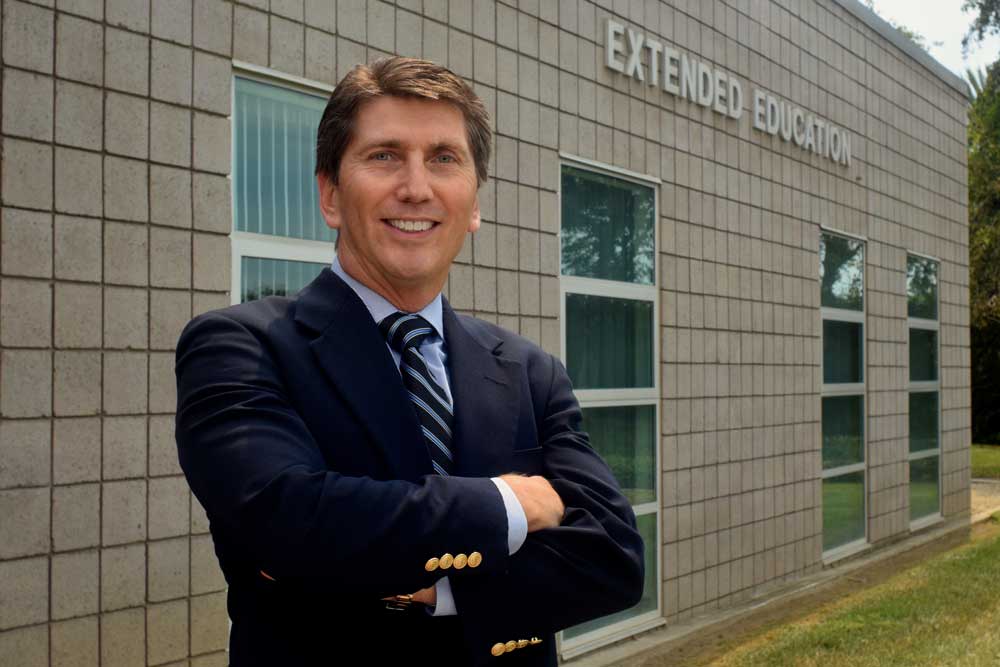“I love the audience we serve.” That’s how J. Kim McNutt, Dean of the College of Continuing and Professional Education at California State University, Dominguez Hills, describes his work. For McNutt, that audience includes diverse, lifelong learners.
“CSUDH itself serves many first-generation students, many come from migrant backgrounds and are people of color whose parents never attended college, but instilled a respect for education and worked to provide it for their children,” McNutt explains. “At the College of Continuing and Professional Education, the audience is the same in many respects, but our focus is on working adults who are re-skilling, upskilling, or seeking a short-term certificate, or microcredential, that will help them either get a job in an in-demand industry or to advance in their current careers.”
Variety and Flexibility
At any given time, the College of Continuing and Professional Education (CCPE) offers an education and training portfolio of between 60 and 70 programs including a Community College Teaching Certificate and a Refinery Safety Technician Preparation Certificate. CCPE serves residents of Southern California on-ground and worldwide with online programs.
“It’s really only recently that students, and their parents, have started to question the ROI of a university degree,” McNutt explains. “Traditionally, university was about preparing graduates to view the wider world and to understand the responsibilities of an educated citizenry, the initial focus was not on ensuring students could get good jobs after graduation. Now, in higher education all over, we are seeing younger students delaying college entry to work and think about what they want to learn first, and we are seeing more mature students starting and continuing programs at any point in their lives. It’s certainly part of a trend that is blurring the distinctions between traditional and non-traditional students.”
Change Should Never Stop
Staying on top of economic, behavioral and demographic trends that impact enrollment is essential, McNutt believes because it demands responsive innovations.
“Everyone who follows higher education has been monitoring the closures of small liberal arts colleges that failed to respond to market forces and just didn’t change,” he says. “The schools that will be successful in the long term will be those that can offer many alternative forms of education and forms of credentials that are high quality and trustworthy among students and their employers. It’s all about expanding the circle with more certificates and more microcredentials to augment or supplement the college degree, if they choose to do so.”
Strategy, Strategy, and More Strategy
As a self-supporting college, CCPE does not receive any state-supported funding. The college is the entrepreneurial arm of CSUDH. This success allowed McNutt to lead changes at CCPE that feature varying combinations of autonomy and community.
“I see our program development strategy as a ‘test kitchen’ where we can create and pilot new courses and programs in response to our community stakeholders and how they help to define future workforce needs,” says McNutt. “We have the autonomy to acknowledge when a certificate is no longer viable and the agility to ensure there are two or three new programs that are. We don’t replace as much as we evolve. The test kitchen approach allows us to be more entrepreneurial in spirit and many students choose us for that reason.”
To gather the industry intelligence essential to ongoing program development, McNutt sits on several university and broader national and community boards and higher education organizations.
Like most leaders, McNutt attributes the success of CCPE to his team’s hard work. Strategic hires, though, have always been a key part of his strategy.
“My team is hardworking, dedicated and they are experts in what they do,” McNutt says. “My job is to make sure they are empowered to make the decisions and implement the processes they need to be successful. Generally, financial rewards are not what draws talented people to teach college or to become higher ed administrators. I think the culture of innovation and agility that we have created is what incentivizes teachers to teach with us and staff and administrators to commit to our vision.”
Ed note: How I Lead is a new series on The Babb Group blog featuring leaders in higher education who are sharing their insights and experience to support wider collective problem solving in the sector.
Latest posts by Kate Baggott (see all)
- How I Lead: Michael Graham, Vice President of Operations and Technology at NLU - March 22, 2023
- The EdTech News for Friday, March 17, 2023: AI Supports Reading Development, Educators Detect AI-Generated School Work - March 17, 2023
- The EdTech News for Friday, March 10, 2023: Families Coding, Mindsets Changing, and Edusity is Educating - March 10, 2023
